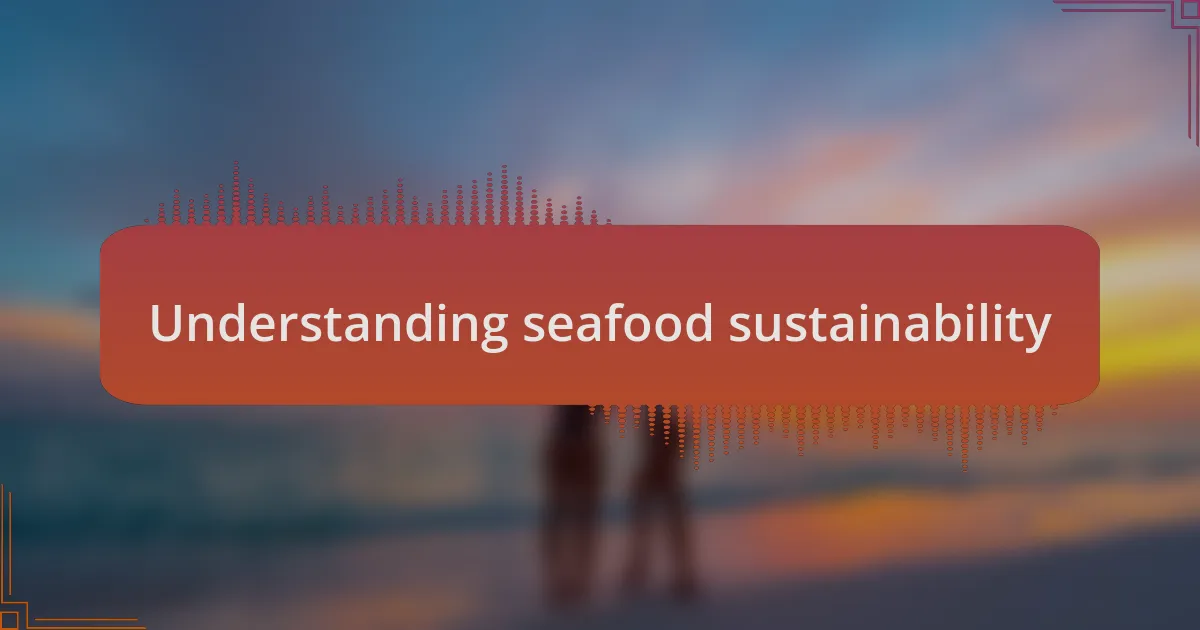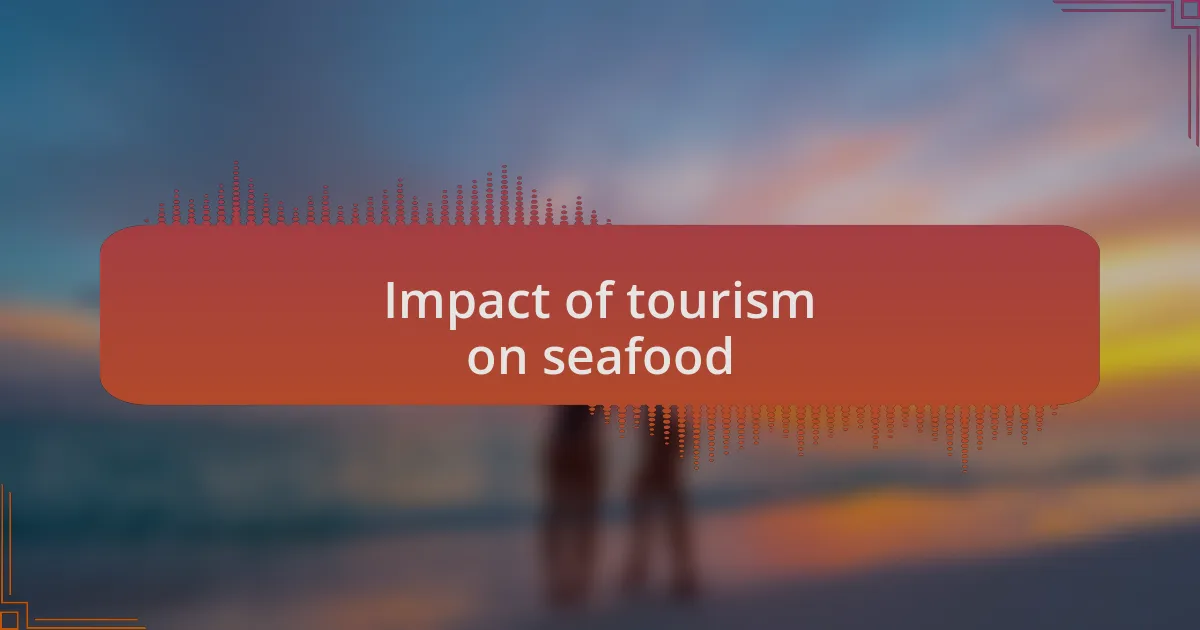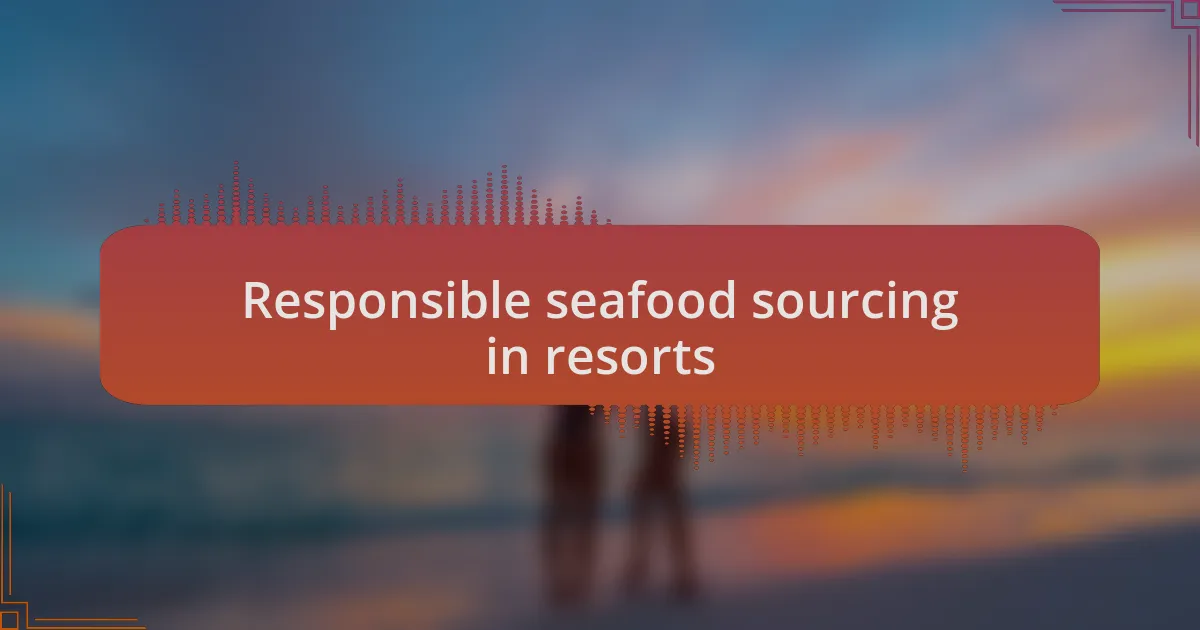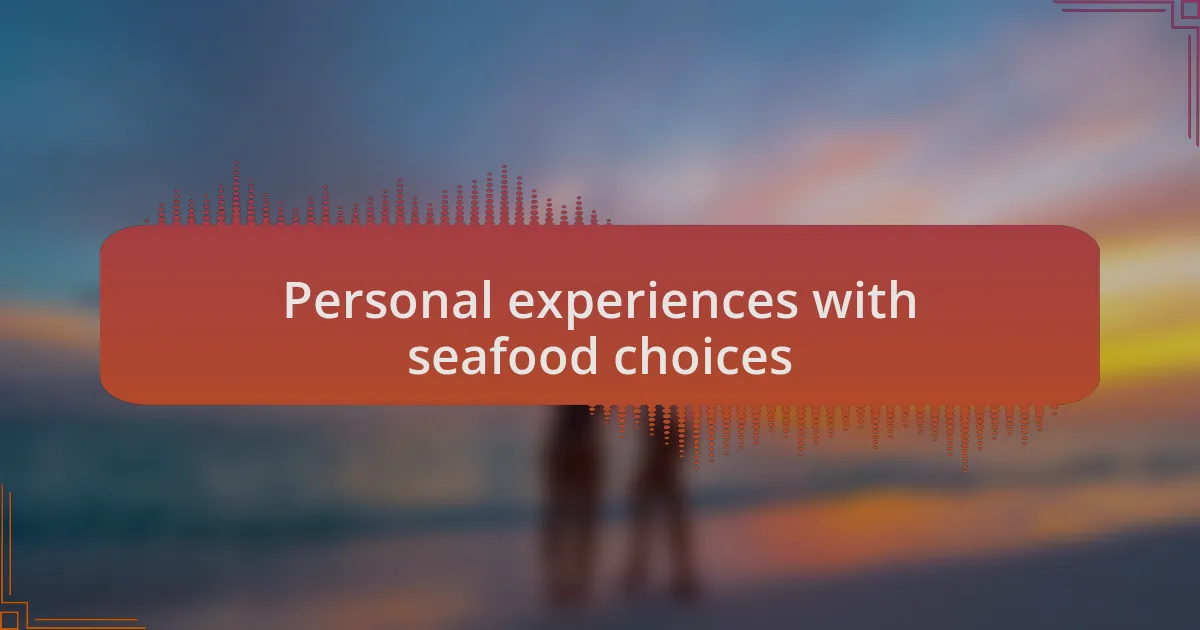Key takeaways:
- Seafood sustainability is essential for maintaining healthy marine ecosystems and supporting local communities.
- Certifications like the Marine Stewardship Council (MSC) help consumers make informed choices that promote responsible fishing practices.
- Tourism can both positively and negatively impact seafood availability, influencing local fishing practices and biodiversity.
- Responsible sourcing in resorts can foster community support and environmental conservation by using sustainably caught seafood.

Understanding seafood sustainability
Seafood sustainability is all about ensuring that our oceans remain healthy and productive while we continue to enjoy their bounty. I remember the first time I learned about overfishing and its impact on fish populations—it struck me how interconnected our dining choices are with the health of marine ecosystems. Have you ever thought about what happens to fish stocks if we don’t manage them properly?
When I first explored this topic, I was surprised to learn about the various certifications and labels that help consumers make informed choices, like the Marine Stewardship Council (MSC) label. These certifications are more than just stickers; they represent a commitment to responsible fishing practices that protect not just the fish, but entire marine habitats. It made me reflect on how my purchasing power can directly influence the seafood industry.
Understanding seafood sustainability also involves grasping the broader implications of our consumption. For example, how does fishing affect local communities and economies? I’ve seen it firsthand. In some Caribbean locales, sustainable fishing practices not only preserve fish stocks but also support local fishermen’s livelihoods, ensuring that future generations can continue to thrive in harmony with nature. Isn’t it empowering to realize that our choices can support both the environment and communities?

Importance of sustainable seafood
Sustainable seafood is essential not just for our plate, but for the very health of our oceans. I recall a fishing trip I took where our guide emphasized the importance of catching only what we needed. That moment shifted my perspective; it’s about respecting nature’s limits. Have we all been mindful of how much we consume?
The reality is that unsustainable practices threaten marine biodiversity. The first time I witnessed a thriving coral reef, I was in awe of the rich life it supported. But then, I learned that overfishing and habitat destruction could wipe that beauty away. Isn’t it shocking to think that our actions could lead to a world without such vibrant ecosystems?
Moreover, sustainable seafood choices help build resilience within local economies. I remember chatting with a local fisherman who shared stories about how his community has rallied around responsible fishing practices. It’s inspiring to see how such efforts can lead to stronger connections between people and their environment. Don’t you agree that supporting the livelihoods of these fishermen creates a ripple effect, benefiting not just individuals, but entire communities?

Overview of Caribbean seafood practices
Caribbean seafood practices vary widely across the region, with traditional techniques coexisting alongside modern, industrial approaches. I once visited a small fishing village where nets were woven by hand, reflecting a deep connection to the ocean and its rhythms. Doesn’t it evoke a sense of pride knowing that such customs still thrive in a world dominated by mechanization?
Many Caribbean islands are embracing sustainable practices due to their reliance on the ocean for both sustenance and tourism. I remember participating in a local cooking class where the chef showcased only seasonal, responsibly-sourced fish. This experience highlighted how community choices directly impact the ocean’s health and the local economy. It’s fascinating how our dining decisions can trickle down to influence conservation efforts, don’t you think?
Additionally, some countries have established regulations to protect vulnerable species, promoting a seafood culture that respects both nature and tradition. I can’t help but reflect on a diving excursion where I witnessed a vibrant underwater world that relied on sustainable fishing to thrive. How can we not feel a sense of urgency to preserve such beauty for future generations? The intertwined fate of our ecosystems and our culinary experiences is truly remarkable.

Impact of tourism on seafood
Tourism significantly influences seafood availability and practices in the Caribbean. When I attended a bustling seafood festival in a coastal town, I saw firsthand how tourists’ demand for certain types of fish can lead to overfishing. It made me wonder, are we truly aware of the long-term effects our appetites can have on the ocean’s ecosystem?
The increased foot traffic from visitors can also put pressure on local fishermen, often pushing them to adopt unsustainable methods to meet supply. I remember chatting with a fisherman who lamented that his catch had diminished over the years. His stories painted a vivid picture of change, leaving me to ponder whether the very tourism that supports local economies might also be jeopardizing their future.
On the other hand, tourism can foster a greater appreciation for sustainable seafood practices. During a whale-watching trip, I learned how preserving marine life is essential for both biodiversity and the tourist experience. Isn’t it incredible how a single activity can promote conservation awareness while enhancing the joy of traveling in this vibrant region?

Responsible seafood sourcing in resorts
Responsible seafood sourcing in resorts is crucial for maintaining the delicate balance of marine ecosystems. While enjoying a meal at a resort’s beachfront restaurant, I noticed that they proudly displayed certifications for sustainable seafood. This showcases a commitment to procuring fish from sources that follow environmentally responsible practices, making diners aware of their choices.
When I conversed with the resort’s chef about their seafood dishes, he explained how they collaborate with local fisheries that abide by sustainable guidelines. I could feel his passion for supporting these small-scale fishermen who prioritize healthy fishing practices. It struck me how these partnerships not only ensure freshness but also help preserve local fish populations, creating a ripple effect of positivity for the community.
Additionally, I can’t help but reflect on how often I’ve seen menus featuring seasonal catches and locally sourced seafood. This practice not only showcases the region’s culinary identity but also invites guests to think about their consumption habits. Isn’t it amazing how a simple menu choice can empower resorts to advocate for sustainable fishing, ultimately benefiting the environment and strengthening the bonds within local communities?

Personal experiences with seafood choices
During my visits to various Caribbean resorts, I often found myself in the delightful dilemma of choosing between dishes featuring local seafood. One evening, after ordering a catch-of-the-day special, I struck up a conversation with the waiter about his recommendations. He shared how this fish was caught just hours earlier by local fishermen adhering to sustainable practices. It made me feel good knowing that my meal not only supported the local economy but also contributed to the health of the marine ecosystem.
On another occasion, I remember a beachside restaurant where the seafood menu had a little note next to each item, detailing its source. As I read through the listings, I felt a sense of connection to the ocean and the community. I realized that opting for responsibly sourced seafood was not just a choice for me, but a commitment to preserving beautiful coastlines and vibrant underwater life for future generations. It’s like I was part of a larger movement, where my dining choices had the power to make a positive impact.
Reflecting on these experiences, I can’t help but wonder how many others are aware of the ripple effects their meals can create. Each time I choose to indulge in responsibly sourced seafood, I feel a sense of responsibility and pride. Why not enjoy the sublime taste of the ocean while also ensuring its sustainability? It’s a win-win that just makes sense.